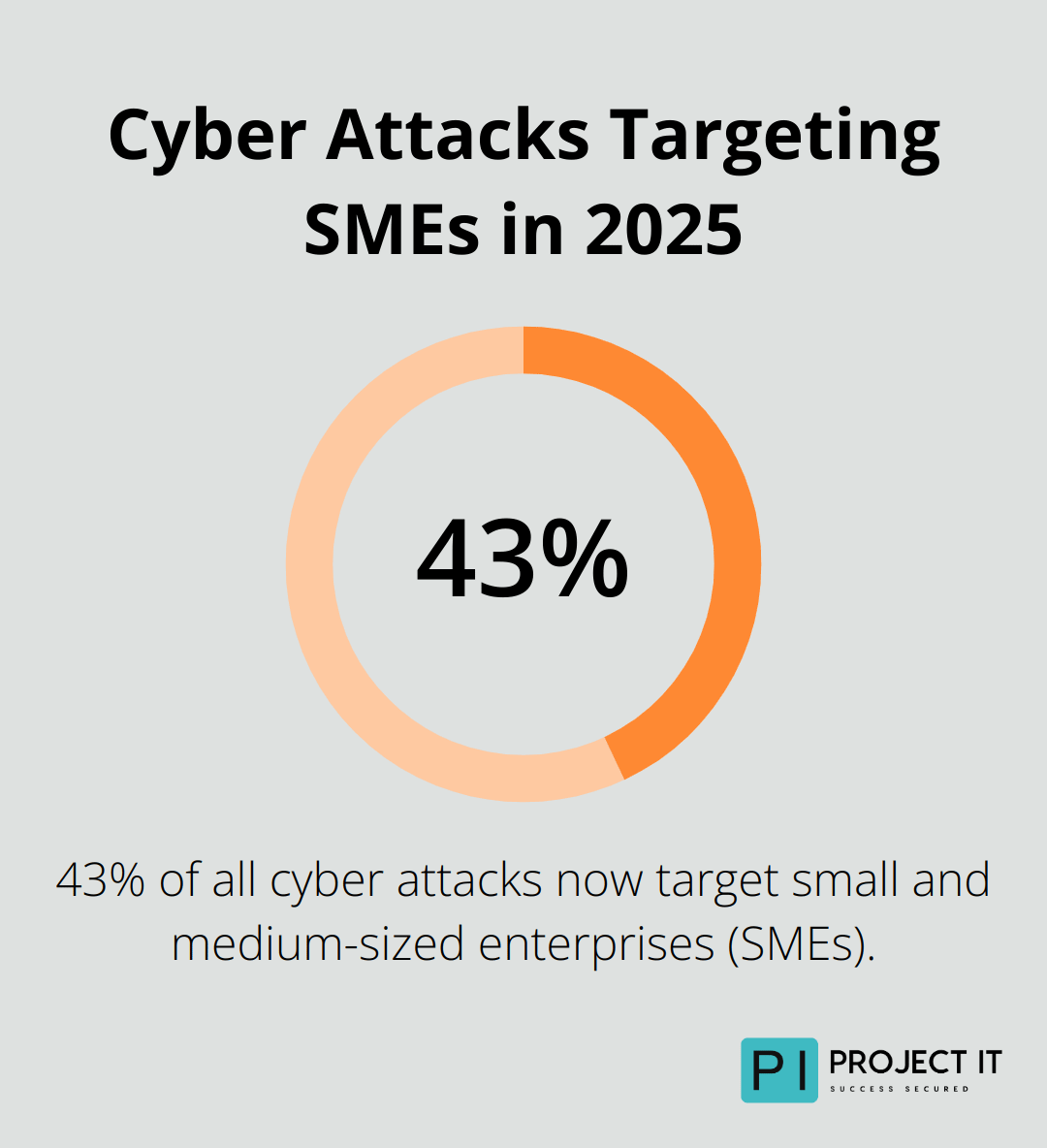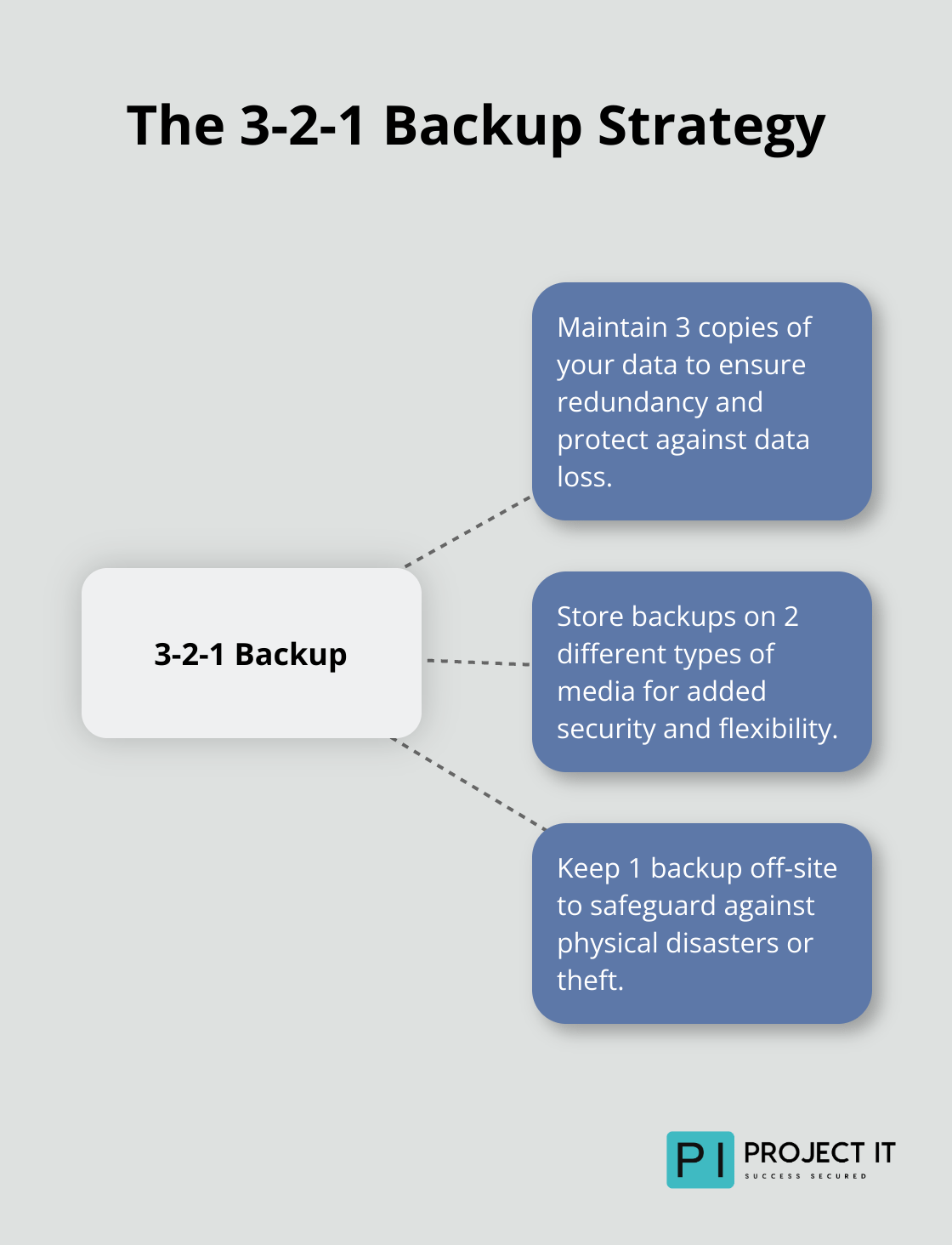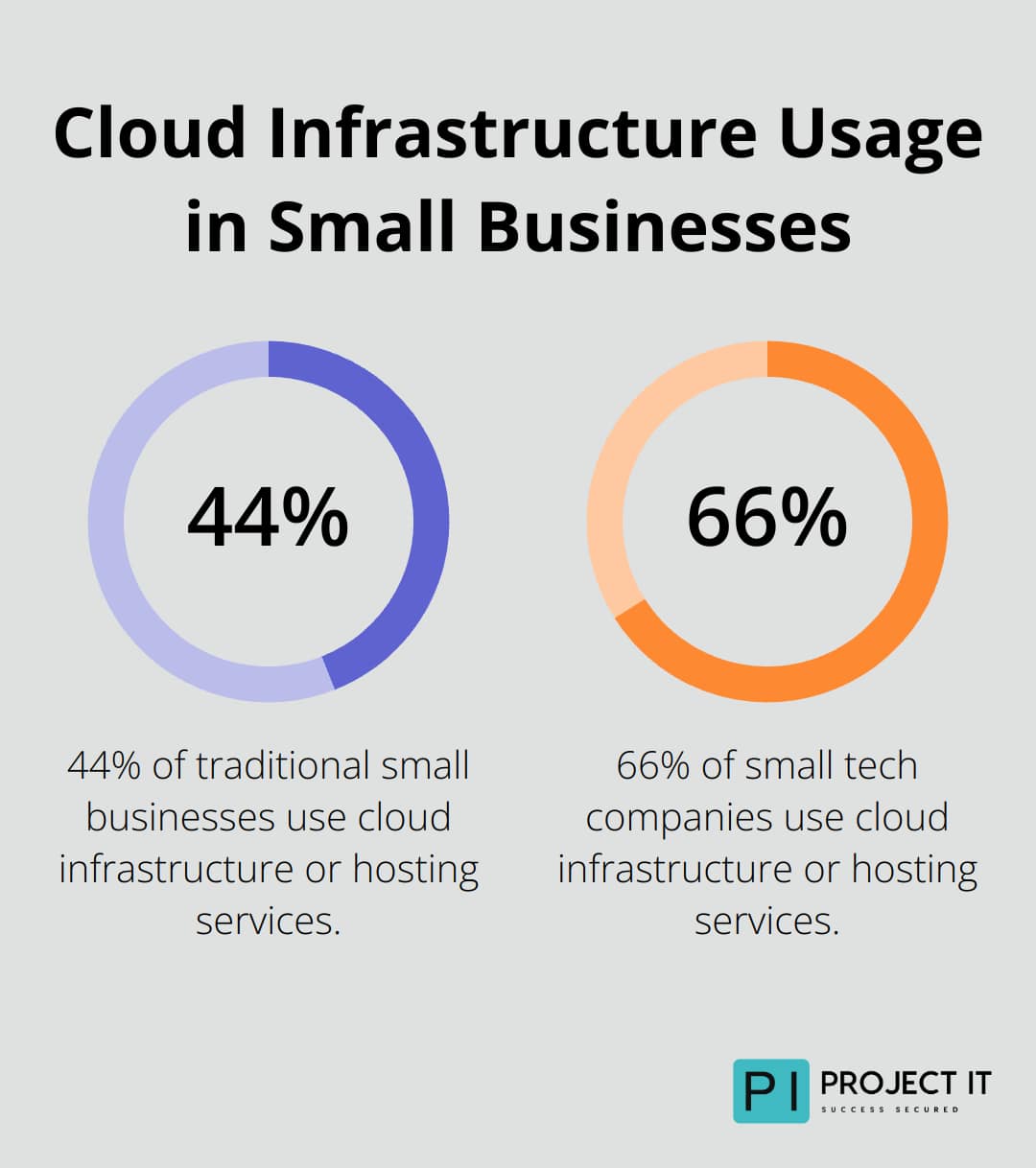Small businesses are under attack. In 2025, cyber threats have become more sophisticated and frequent, targeting companies of all sizes.
At Project IT, we’ve seen a surge in small businesses seeking cyber security solutions to protect their assets and reputation. This blog post will explore why small businesses can’t afford to ignore cyber threats and provide practical steps to enhance their digital security.
The Hidden Costs of Cyber Attacks
The Alarming Rise of Small Business Attacks
In 2025, the cyber threat landscape for small businesses has become increasingly treacherous. Recent data from the New Zealand Cyber Security Centre reveals that 43% of all cyber attacks now target small and medium-sized enterprises (SMEs). This marks a significant increase from previous years, highlighting the urgent need for enhanced security measures.

The average cost of a data breach for SMEs in New Zealand has skyrocketed to approximately $173,000 NZD. This figure represents a substantial financial blow that many small businesses struggle to recover from. Even more concerning, only 7% of small businesses feel adequately prepared to handle a cyber incident.
Common Threats Plaguing Small Businesses
Ransomware attacks have emerged as the most prevalent threat, with 82% of such attacks in 2025 targeting companies with fewer than 1,000 employees. These attacks can cripple operations, leading to significant downtime and potential data loss.
Phishing scams continue to evolve, becoming increasingly sophisticated and harder to detect. Many small business employees fall victim to these scams, inadvertently compromising sensitive company data.
Malware infections account for 18% of cyber attacks on small businesses, often exploiting outdated software and weak security protocols.
The Far-Reaching Consequences
The financial impact of cyber attacks extends far beyond the immediate costs. According to a study by Verizon, 55% of U.S. consumers would be less likely to continue business with a company that experienced a data breach. This loss of customer trust can lead to long-term revenue decline and reputational damage.
Moreover, 51% of small businesses report that their website was down for 8 to 24 hours following an attack. This downtime can result in substantial lost revenue and missed opportunities.
Perhaps most alarmingly, 75% of SMBs could not continue operating if they were hit with ransomware. This statistic underscores the existential threat that cyber attacks pose to small businesses.
The Myth of Being “Too Small to Target”
A significant barrier for SMEs is the persistent myth that they are “too small to target” by cyber criminals. This misconception (often coupled with a lack of resources) leads many small businesses to rely on outdated defences like basic antivirus software, which prove insufficient against modern cyber threats.
Small businesses must recognise that their size does not protect them from cyber attacks. In fact, cyber criminals often view smaller companies as easier targets due to their typically weaker security measures.
The Need for Comprehensive Security Measures
The stark reality of cyber threats in 2025 demands that small businesses take immediate action to protect their digital assets. From implementing strong password policies to investing in employee training, every step towards enhanced cyber security can make a significant difference.
In the next section, we will explore essential cyber security measures that small businesses can implement to fortify their defences against these ever-evolving threats.
How Small Businesses Can Fortify Their Cyber Security in 2025
In 2025, small businesses must take proactive steps to safeguard their digital assets. The landscape of cyber threats continues to evolve, and robust security measures are no longer optional-they are a necessity for survival.
Implement Strong Password Policies
Weak passwords are a hacker’s best friend. A strong password policy requires complex, unique passwords for each account. Passwords should be at least 16 characters long, combining uppercase and lowercase letters, numbers, and symbols.
Password managers generate and securely store complex passwords. LastPass reports that 91% of people know reusing passwords is risky, yet 66% still do it. Your organisation must break this dangerous habit.
Multi-factor authentication (MFA) adds a crucial layer of defence. While the ideal goal is to achieve 100% protection, currently only 28% of users have enabled MFA, and they are still targeted by attackers.
Maintain Up-to-Daté Systems
Outdated software is a major vulnerability. Cyber criminals often exploit known security flaws in older versions of software. Establish a regular schedule for updating all your systems and applications.
Enable automatic updates wherever possible. For critical systems, test updates in a controlled environment before rolling them out company-wide. This approach balances security with operational stability.
Invest in Employee Education
Your employees are your first line of defence against cyber threats. Regular, comprehensive security awareness training is essential. Cover topics like identifying phishing emails, safe browsing habits, and proper handling of sensitive data.
Make training engaging and relevant. Use real-world examples and simulations to emphasise the importance of cyber security. The 2021 Verizon Data Breach Investigations Report found that 85% of breaches involved a human element. Proper training can significantly reduce this risk.
Establish a Robust Backup Strategy
In the event of a successful attack, recent, secure backups can be the difference between a minor setback and a business-ending disaster. The 3-2-1 backup strategy is highly effective: maintain three copies of your data, on two different media, with one backup kept locally and two off-site.
Test your backups regularly to ensure quick and complete restoration. A study by Spanning revealed that 58% of companies that experienced data loss due to a breach took more than a day to recover their data. Your business should not become part of this statistic.

These essential measures can significantly enhance a small business’s cyber security posture. However, the landscape of cyber threats is constantly changing. In the next section, we will explore affordable cyber security solutions that can help small businesses stay ahead of emerging threats in 2025.
Affordable Cyber Security Solutions for Small Businesses in 2025
Small businesses in 2025 face a significant challenge: protecting themselves from cyber threats without overspending. Fortunately, affordable cyber security solutions are now more accessible than ever. This chapter explores cost-effective options that can substantially enhance digital security for small enterprises.
Cloud-Based Security Services: A Revolution for SMEs
Cloud-based security services have transformed cyber security for small businesses. These solutions offer enterprise-level protection at a fraction of the cost of traditional on-premises systems. About 44% of traditional small businesses use cloud infrastructure or hosting services, compared to 66% of small tech companies.

Microsoft 365 Business Premium stands out as an excellent option. It includes advanced threat protection, data loss prevention, and mobile device management. At approximately $22 per user per month, it provides an affordable way to secure business emails, documents, and devices.
Cisco Umbrella is another popular choice. This cloud-native platform combines multiple security functions into one solution. It blocks malware, phishing attempts, and botnet activities before they reach your network. With pricing starting at $2.20 per user per month, even the smallest businesses can access this protection.
Managed Security Service Providers: Expert Protection on a Budget
Managed Security Service Providers (MSSPs) offer a compelling solution for businesses that lack in-house IT expertise. These providers offer 24/7 monitoring, threat detection, and incident response services at a predictable monthly cost.
The starting cost for managed security services for a business with 25 IPs is around $2,275 per month. This is a starting point and costs can vary depending on specific needs and service levels.
Project IT, as a leading MSSP in New Zealand, offers comprehensive managed security services. Our solutions help small businesses significantly improve their security posture at competitive rates.
Open-Source Security Tools: Free But Powerful
Open-source security tools can be a budget-friendly option for tech-savvy small businesses. These tools are often free to use and can be highly effective when properly implemented.
Snort, an open-source intrusion detection system, is used by many businesses worldwide. It performs real-time traffic analysis and packet logging on IP networks.
OpenVAS, a vulnerability scanner used by numerous organisations, identifies security holes in your network and suggests remediation steps.
However, open-source tools often require significant technical expertise to set up and maintain effectively. The cost savings may be offset by the time and resources needed to use these tools properly if in-house expertise is lacking.
Government and Industry Resources: Free Expert Guidance
Many governments and industry bodies offer free cyber security resources tailored for small businesses. In New Zealand, CERT NZ provides a wealth of guidance, including step-by-step advice on implementing cyber security measures.
The U.S. Small Business Administration offers a free cyber security course that covers the basics of protecting your business.
Industry-specific resources can also prove invaluable. For example, the Payment Card Industry Security Standards Council offers free guidance for businesses that handle credit card transactions.
Final Thoughts
The digital landscape of 2025 presents unprecedented challenges for small businesses. Cyber threats target companies of all sizes with increasing frequency and sophistication. The consequences of ignoring these threats can lead to financial ruin and irreparable damage to reputation.
Small business owners must recognise cyber security as a critical investment in their company’s future. Implementation of robust security measures, even with limited resources, can significantly reduce the risk of falling victim to cyber attacks. Key steps include strong password policies, regular system updates, employee training, and reliable data backup strategies.
At Project IT, we understand the unique challenges faced by small businesses in New Zealand. Our team delivers tailored cyber security solutions that align with specific needs and budget constraints. We help you navigate the complex world of digital security, ensuring your business remains protected against evolving threats.


